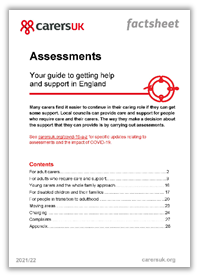How can I identify myself as a carer?
When you have caring responsibilities, it can be really helpful to prove your role to access some types of services and support. This can be useful for many reasons, from receiving discounts to receiving special assistance or a bit of extra support from professional and public services.
There is no official national carer card scheme currently, but we have seven suggestions of different ways you can offer proof that you are a carer.
What are the ways I can provide proof of my caring role?
Here are some examples of ways you can provide evidence if needed:
- Do you receive Carer's Allowance or Carer's Credit and if so, do you have a copy of the letter that shows you have been awarded this? This can be a clear way to identify that you're a carer.
- Does someone for whom you provide care have an award letter, such as Attendance Allowance or Personal Independence Payment for example. You could contact the relevant benefit office and ask if they could send a letter confirming this so that you can use it as evidence.
- If you haven't already, it's a good idea to register as a carer with your GP. Not only will they be able to consider your caring responsibilities in relation to any care you need, but health care professionals might also be able to provide documentary evidence you can use such as a letter.
- There is no guarantee, but some carer support centres run their own carer card schemes in the local area. To locate your nearest centre and to find out if they operate a scheme in your area, use our carer directory or contact your local authority or Health and Social Care Trust in Northern Ireland. Sometimes they may be referred to as an emergency carer card.
- If you haven't already, you could request a carer's assessment. This can help you start to get the support you need alongside professional recognition of the extra work and support you are providing through your caring responsibilities.
- Are you balancing your caring role with paid employment? Many employers are waking up to the needs of their caring employees and will have policies in place to offer support. Some also operate a 'carer passport scheme' to help working carers gain recognition and support for the extra work they're doing beyond their paid roles. The carer passport may also be used by health care providers or in local community organisations. Read more.
- Do you care for someone who has a Blue Badge? This enables them to have vehicle assistance support and priority parking for example if they have a disability. Learn more about the Blue Badge Scheme.
What if I’m not happy with the service or I feel like my needs as a carer are being ignored?
If you, or the person you are looking after, are having difficulties with a health or social care service or other provider, you could look into making a complaint to try and resolve these issues.
We also offer a self-advocacy guide for unpaid carers. This can help you assert your needs and be heard among professional decision makers or otherwise challenge a decision if you feel you have been treated unreasonably.


